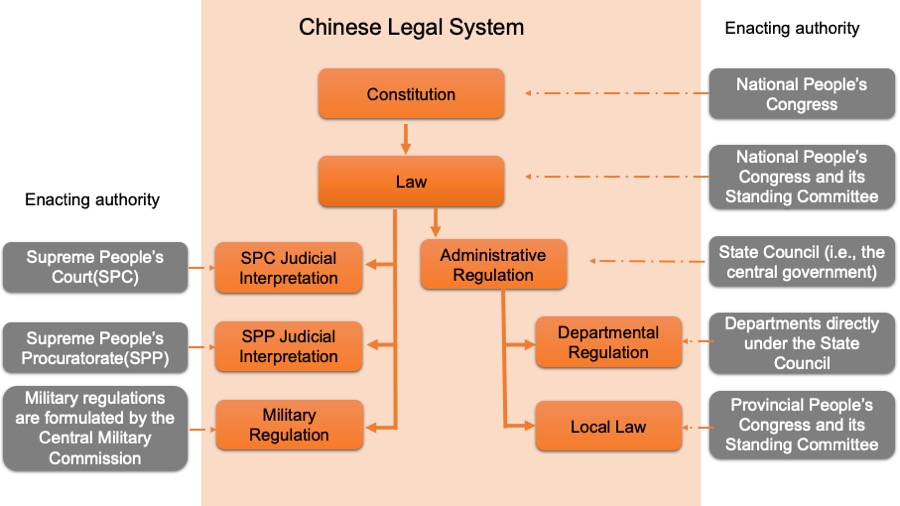China’s laws and regulations can be divided into four levels in terms of effectiveness in a descending hierarchy: (1) The Constitution; (2) Laws; (3) Administrative regulations, judicial interpretation, military regulations; (4) Local laws and regulations, departmental regulations.

I. What’s the Chinese legal system?
According to China’s Constitution and the Legislation Law, the effectiveness levels (from high to low) and the authorities enacting the above laws and regulations are as follows:
Level 1:
The Constitution, formulated by the National People’s Congress (NPC), prevails over all other laws and regulations.
Level 2:
The Laws are formulated by the NPC (basic laws) and its Standing Committee (general laws).
Level 3:
(1) Administrative regulations are formulated by the State Council (i.e., the central government).
(2) Judicial interpretations are formulated by the Supreme People’s Court (SPC) and the Supreme People’s Procuratorate (SPP).
(3) Military regulations are formulated by the Central Military Commission (CMC).
Level 4:
(1) Local laws and regulations are formulated by the Provincial People’s Congress and its Standing Committee, with the effect covering the areas under its jurisdiction;
(2) Departmental regulations are formulated by the departments directly under the State Council, with the effect covering the national matters falling within their functions and powers.
II. How to search Chinese laws and regulations
1. Authoritative sources:
Given the authoritative sources are the channel for the official release of laws and regulations, the content thereof is the most authoritative.
A. Laws: Gazette of the NPC Standing Committee
B. Administrative regulations: State Council Gazette
C. Judicial interpretation of the SPC: Gazette of the SPC
D. Judicial interpretation of the SPP: Gazette of the SPP
E. Local laws and regulations: at present, there is no all-in-one authoritative source for all local laws and regulations in China, and such local laws and regulations are issued respectively by their own Provincial People’s Congress.
F. Departmental regulations: along with the administrative regulations, the departmental regulations are also issued by the State Council Bulletin.
2. Official legal databases:
At present, China’s official legal databases not only require further improvement, but are also troubled, more or less, by the following problems:
i. The data update lags behind for several months;
ii. The data can’t be retrieved according to the lawmaker, promulgation time, effective time, subject, etc.;
iii. The users can’t easily understand the status of effectiveness of the laws and regulations, for instance, whether they’ve been amended or abolished.
iv. Some databases are no longer updated, or the web page links have gone dark.
However, some of these official databases are still updated with generally error-free contents, so we can still refer to their contents in a limited way.
These databases include:
A. Laws and Regulations Database of China Law Information, subordinate to the Ministry of Justice
B. Policy Database of the State Council, subordinate to the State Council
C. Laws and Regulations Database of China Court, subordinate to the SPC
D. China Judgements Online, subordinate to the SPC
E. China Treaty Database, subordinate to the Ministry of Foreign Affairs
In Dec. 2016, the Chinese government issued the 13th Five-year Plan for National Informatization (“十三五”国家信息化规划), which included the development of national laws and regulations database. We are looking forward to its progress.
Moreover, there are legal databases provided by commercial entities, all of which require paid subscriptions. In fact, these databases often trump official databases in many ways. Nevertheless, to ensure accuracy and quality in substance and in format, we suggest that you learn about the existence of a law in the commercial legal database, and then verify such a law in the authoritative source or the official legal database.
These commercial legal databases include:
A. China Laws Portal, subordinate to China Justice Observer
B. People’s Data, subordinate to People’s Daily
C. CNKI China Laws and Regulations Database, subordinate to CNKI
D. PKULAW, subordinate to a company associated with Peking University
E. Lawyee China Legal Resources, subordinate to Beijing Lawyee Co., Ltd.
You may also be interested in articles in the following tags:
Other posts you may also be interested in are as follows:
How Do Elections in China Work?
What is the Crime Rate in China?
How Many Crimes Are Punishable by Death in China?
What is the Court System Like in China?
What Are the Main Laws in China?
What is the Conviction Rate in China?
For more interesting posts about Chinese Law, please check China Law in One Minute.
Cover Photo by tong zhou(https://unsplash.com/@zt1970) on Unsplash.
Contributors: Guodong Du 杜国栋






